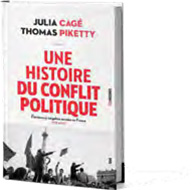The Jéco ("Journées de l'économie" / Economics Days), of which the ENS de Lyon is a partner, will be held from November 14 to 16, 2023.
Emmanuel Trizac, ENS de Lyon President, is publishing an opinion piece in the Jéco Mag.
As part of the Jéco program, Julia Cagé and Thomas Piketty will be at ENS de Lyon on Wednesday, November 16 to present their latest book Une histoire du conflit politique. Élections et inégalités sociales en France, 1789-2022 (A history of political conflict. Elections and social inequalities in France, 1789-2022).
"Who votes for whom and why? How did the social structure of different political electorate evolve in France from 1789 to 2022? In Une histoire du conflit politique, the evolution of electoral behaviour and socio-spatial inequalities in France is presented in unprecedented historical depth.
The authors emphasize that the determinants of voting are above all socio-economic. I'll be focusing less on the conclusions here than on the method, which holds so much promise for the future of social science research. Cagé and Piketty's book is based on a considerable amount of data gathered from 36,000 French communes over a long electoral period. Was it the work of a historian, a data scientist, a political scientist or an economist? Complex issues such as crises and conflicts call for different disciplines and rigorous methodology. The unehistoireduconflitpolitique.fr website gives access to all the data and includes hundreds of interactive maps, graphs and tables, to which readers can refer to deepen their own analyses. This approach can only inspire us.
Multidisciplinary
In early 2023, ENS de Lyon has established an innovative economics research structure, the Center for Economic Research for Governance, Inequality and Conflict. This laboratory focuses on the exploration of research questions that are crucial to contemporary society, such as governance, information dissemination and conflict resolution. It involves several disciplines, in order to provide a better understanding of current crises, characterized by an interweaving of political, economic, social and environmental factors.
Digital and data processing
The digitization of our societies has revolutionized the way we do and think about research. The digitization of historical sources, the availability of previously unpublished administrative data, the contribution of machine learning to data collection and processing - these are just some of the tools that are opening up the field of possibilities. For example, the ANR DISRUPT project led by Sophie Hatte explores the way in which social networks shape information production and political dynamics, based on the extensive collection and automated analysis of content disseminated on these platforms.
How to measure the large-scale impact of artisanal mining on conflict, environmental degradation and migration in Sub-Saharan Africa? Mathieu Couttenier, Director of the Center for Economic Research, is experimenting with this question in his ArtiMinDev research project, awarded an ERC Consolidator grant. Cédric Chambru is also building a database of social conflicts from the Middle Ages to the 19th century.
Open science
At a time when fake news and conspiracy theories are proliferating, this free public dissemination approach is essential. At ENS de Lyon, we have just adopted an Open Science roadmap.
Through these three major points, research develops its impact. Sharing knowledge contributes, through complex issues, to enlightening public debate and identifying possible solutions. I don't think I'm wrong in saying that this is also one of Cagé and Piketty's ambitions. It's also why ENS de Lyon has been a founding partner of JECO since its beginnings."
Emmanuel Trizac, ENS de Lyon President

Une histoire du conflit politique. Élections et inégalités sociales en France, 1789-2022
(A history of political conflict. Elections and social inequalities in France, 1789-2022)
Authors:
- Julia Cagé, professor at Sciences Po, laureate of the Best Young Economist Award.
- Thomas Piketty, Director of Studies at the École des Hautes Etudes en Sciences Sociales (School of Advanced Studies in the Social Sciences)) and Professor at the Paris School of Economics.
"Politique Éco-Histoires" series, Seuil Publisher, published 08/09/2023





